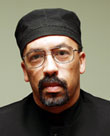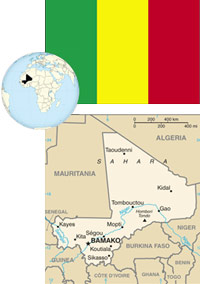Mali and the Collapse of Nation-States
By Bill Fletcher, Jr. -Guest Columnist- | Last updated: Aug 6, 2012 - 12:28:16 PMWhat's your opinion on this article?

|
The gist of the situation is that a revolt broke out in the northern part of Mali among the ethnic group known as the Touareg or Azawad. They are a Berber people who live in the Saharan region of Africa. There has been a long-standing ethnic tension in Mali (going back to when Mali became independent of France) and in the aftermath of the overthrow of Col. Gadhafi in Libya, guns began flowing very freely into northern Mali. The government of Mali attempted to stop the rebellion, but suffered a series of military defeats. This, ultimately, led to a military coup against the government of Mali. In the aftermath of this coup, the country has, in effect, become a divided land with the Northern part in the hands of various rebel groups and the Southern part under a military dictatorship.

Mali must be saved and this will necessitate a dynamic role for the African Union, and perhaps the United Nations. It is not a role that should involve the U.S. military, however, which will certainly be the impulse of those forces that see Muslim fundamentalism as the main threat to humanity. Mali must be saved through negotiations and the active role of Mali’s neighbors. |
The fact that the rebellion has resulted in various rebel groups operating in the Northern part of Mali–rather than a unified movement–set the stage for chaos and a retreat into Muslim fundamentalist irrationalism on the part of some of the forces. For instance, the historic city of Timbuktu has been occupied by fundamentalists who have proceeded, much like the Taliban did in Afghanistan in 2001, to destroy historic sites. Muslim burial grounds, for instance, that date back to the 14th century have been destroyed by these forces allegedly because they represent something contrary to Islam.
While some people will focus on the problem of Muslim fundamentalism in Mali, the major problems revolve around 1) the inability of states created as a result of European colonialism to survive in the current era without an economy that they control and that serves the needs of their people; 2) The lack of popular democracy, and 3) An inability and/or unwillingness to resolve long-standing ethnic issues. With regard to ethnic conflict, there is the specific problem faced by the Touareg. They are found not only in Mali but in several countries in that region. They have raised demands for national equality and national sovereignty. Yet, as with many other ethnic groups, these demands have largely been ignored by the dominant forces in the respective countries leading to slippage into ethnic strife and civil war.
Muslim fundamentalism of the irrationalist sort that we are witnessing in Mali is not only an embarrassment to Muslims, but a criminal enterprise destroying some of the most important historical features of Mali. Yet these forces did not pop out of nowhere. The Libyan revolution and the NATO intervention helped to unleash unintended consequences. It is also the case that some of these same forces have been created or backed by various governments in the region in order to serve as proxy armies to carry out their own objectives.
Mali must be saved and this will necessitate a dynamic role for the African Union, and perhaps the United Nations. It is not a role that should involve the U.S. military, however, which will certainly be the impulse of those forces that see Muslim fundamentalism as the main threat to humanity. Mali must be saved through negotiations and the active role of Mali’s neighbors. It cannot be allowed to sink to the levels of another Somalia, a country broken and all but forgotten until yet another disaster unfolds.
(Bill Fletcher, Jr. is a senior scholar with the Institute for Policy Studies, the immediate past president of TransAfrica Forum, the co-author of “Solidarity Divided” and the author of the forthcoming “They’re Bankrupting Us—And Twenty Other Myths About Unions.” He can be reached at [email protected].)
INSIDE STORIES AND REVIEWS
-
-
About Harriett ... and the Negro Hollywood Road Show
By Rabiah Muhammad, Guest Columnist » Full Story -
Skepticism greets Jay-Z, NFL talk of inspiring change
By Bryan 18X Crawford and Richard B. Muhammad The Final Call Newspaper @TheFinalCall » Full Story -
The painful problem of Black girls and suicide
By Charlene Muhammad -National Correspondent- » Full Story -
Exploitation of Innocence - Report: Perceptions, policies hurting Black girls
By Charlene Muhammad -National Correspondent- » Full Story -
Big Ballin: Big ideas fuel a father’s Big Baller Brand and brash business sense
By Bryan Crawford -Contributing Writer- » Full Story






 Click Here Stay Connected!
Click Here Stay Connected!








